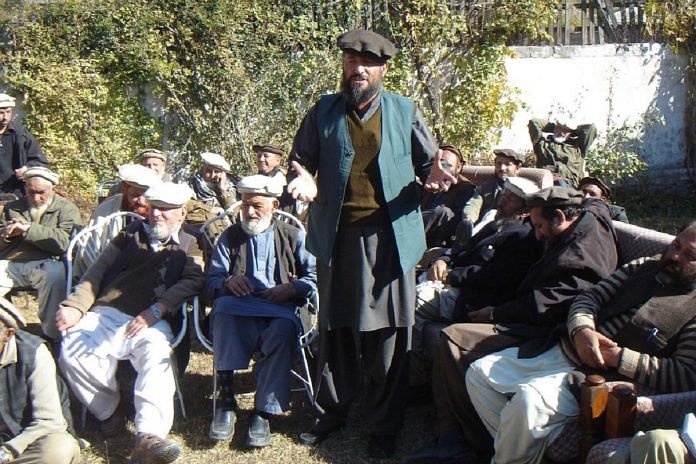Jirgas are tribal councils that consider women property. Earlier this year, the National Assembly gave them quasi-judicial powers, and civil society is incensed.
Innumerable Pakistanis are frustrated by the state of the country’s judiciary. With a backlog of over two million cases, and the fact that courtrooms are few and far between, speedy justice remains a distant dream for common citizens.
Then there are jirgas, or tribal councils. Accessible, swift, and familiar with some of Pakistan’s most arcane tribal traditions, they are seemingly a magic wand for the country’s beleaguered justice system. However, they are not without their pitfalls – the tribal codes by which jirgas are guided consider women property.
Two months ago, a council of village elders ordered the rape of a 16-year-old girl, whose brother had been accused of raping a 12-year-old girl in Raja Ram village in central Pakistan. Shocking though it is, the case is no aberration. Revenge rape, honour killings, and the exchange of women are some of the routine ways through which disputes are resolved.
Far from outlawing these councils, Pakistan’s National Assembly shocked the country by seeking to give these councils quasi-judicial powers earlier this year. It passed a Bill providing legal and constitutional cover to jirga and panchayat systems, in an bid to ensure speedy resolution for “small civil matters” and free the formal judiciary of some of its burden.
A cause for concern
This has naturally caused concern among the civil society. While jirgas have to be certified by the judiciary to dispense justice, they nevertheless tend to be “extremely misogynist, patriarchal, anti-poor, and anti-minority”, says Pakistani commentator and columnist Marvi Sirmed.
“There is an elite capture across jirgas, and they are invariably dominated by maulvis and mullahs,” Sirmed said.
While they cannot adjudicate in criminal matters, for minor disputes, they are widely seen as a quick means of resolution, she explained.
However, the definition of “minor disputes” is inherently fraught. Cases of domestic violence, for example, are widely seen as minor familial disputes, even though the country’s Senate passed a Bill in 2012 making domestic violence a criminal offence in the federal capital, Islamabad. Cases like these, along with those of elopement, “illicit” sex, etc., are then adjudicated by the jirgas, which typically have no female representatives.
Pakistan’s Law Minister, Zahid Hamid, who had tabled the Bill in the National Assembly, sought to assuage concerns of misogynist rulings attaining some sort of legitimacy by saying: “The dispute will be settled with consent of both parties in the dispute, and if any woman feels that she is not being given justice, she can move the court.”
Given that most jirgas operate in remote areas where women can seldom travel outside their villages unaccompanied, it is unrealistic to expect them to possess enough resources to challenge the decisions of jirgas and move courts.
“We have been making a noise for many years to outlaw jirgas altogether. However, they have now been given cover under the garb of ADR (Alternate Dispute Resolution),” Sirmed said.
State doesn’t have a nefarious agenda
While jirgas remain deeply conservative and orthodox, the state does not have a nefarious agenda in giving them legitimacy, activist Afiya Shehrbano said. At worst, “it is a knee-jerk and ham-handed attempt by the state to expedite the justice system,” she said.
“The problem is that the judiciary has not stepped up and said it’s a problem, since they are more concerned with dealing with moral questions like who is corrupt and must be disqualified,” she added.
Indeed, the societal sanction enjoyed by traditional councils apart, the inaccessibility of formal courts makes matters extremely messy. Sure, jirgas do not run on coercion. But people willingly take recourse to them as they are cheap and fast.
“They cannot be broken through state measures. They have to be dismantled at a number of levels,” Shehrbano said.



